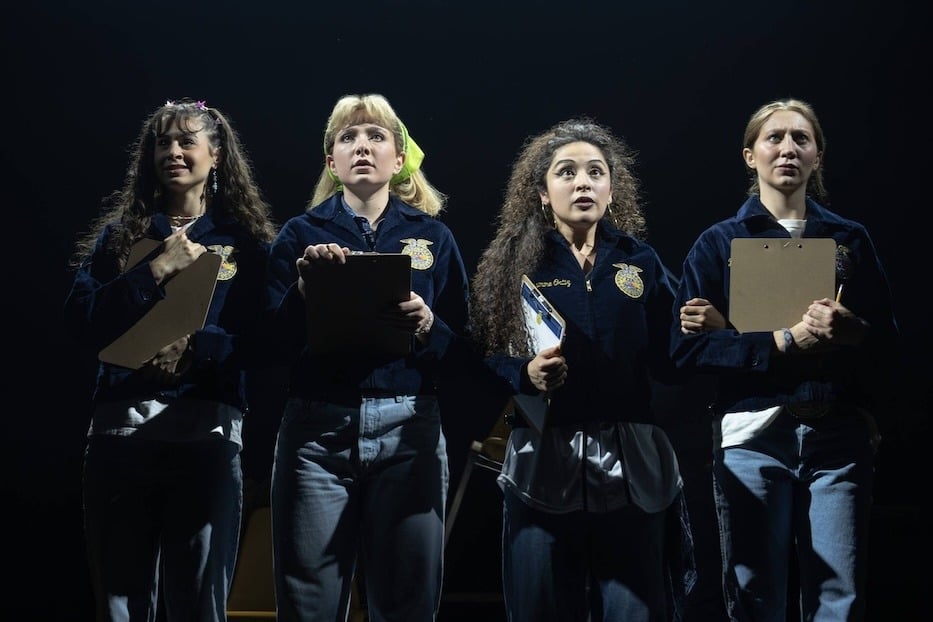
Arts & Culture | Theater | Yale Rep Theatre

A scene from falcon girls by Hilary Bettis, directed by May Adrales. Yale Repertory Theatre, October 10–November 2, 2024. Photo © Joan Marcus.
Four girls stand center stage in tidy FFA (Future Farmers of America) jackets. Nineties pump up music blasts over the speakers while they perform a near-animalistic ritual of preparation, hyping themselves up for the battle ahead. At the zenith of their frenzy the lights shift, and the girls drop into the quiet reality of a regional horse judging competition.
This sharp contrast—the interior and exterior lives of six small-town Colorado girls—is where the new play falcon girls thrives. The show premiered Oct. 17 and runs through Nov. 2 at Yale Repertory Theatre.
Written by Hilary Bettis and directed by May Adrales, falcon girls is a seemingly autobiographical story following 14-year-old H (Gabrielle Policano, called Hilary throughout the show) as she integrates herself into a tight-knit club of girls aiming to compete on the National FFA Horse Evaluation stage.
Winning nationals means they will, in theory, go on to become professional judges of their beloved beasts. Around them, the Colorado skyline is ever present behind wooden slats and large doors of a barn, brought to life by scenic designer Beowulf Boritt. Subtle and skillful costumes by Micah Ohno serve as our markers in time and place.
We first meet the girls when Beverlee (Liza Fernandez) brings her daughter, H (Policano), to the extracurricular FFA club in Falcon, Colorado. The team, guided by the practically angelic Mr. K (Teddy Cañez) take their competition prep seriously, and the kids are not initially warm to H’s arrival.

Alexa Lopez, Anna Roman, Sophia Marcelle, and Annie Abramczyk in a scene from falcon girls by Hilary Bettis, directed by May Adrales. Yale Repertory Theatre, October 10–November 2, 2024. Photo © Joan Marcus.
The girls greet H with teen bullying that feels familiar, almost sketch-like. There is the competitive queen bee Rebecca (Annie Abramczyk), the sexuality-boundary-testing Jasmine (played on opening night by understudy Gabriela Veciana and regularly played by Sophia Marcelle), April (Alexa Lopez), who dreams of moving to L.A., Carly (Alyssa Marek), who struggles with self-harm, and the devout Mary (Anna Roman).
Some of these sketches are filled in as the story goes on. Mary—played with deft humor by Roman—has a secret love of Salt-N-Pepa, an unshakeable devotion to her friends and a healthy questioning of the contradictory structures of her faith. As Jasmine, Veciana lets the audience in on little vulnerabilities as she navigates her place in the friend group, bringing a nicely nuanced performance to life with little notice.
But the characters who don’t get fleshed out speak to a larger question of the production. What does it mean to bring your memories to life on the stage? And what are the intentions of doing so?

Members of the company in a scene from falcon girls by Hilary Bettis, directed by May Adrales. Yale Repertory Theatre, October 10–November 2, 2024. Photo © Joan Marcus.
For example, there are several mentions of a girl from Falcon who had gone missing the previous year and was later discovered murdered. Carly now lives in this girl’s house, sleeping in the very room she was kidnapped from. The threat looms in the periphery of the story, serving as a reminder of the ever-present mortality of young women in America.
But this thread is never truly tied off—its non-conclusion comes in a jumble of heightened emotions the girls have before their final competition. They fear that Jasmine’s phone sex boyfriend has come to the hotel where they are staying, and is actually a serial killer coming to get them. H heroically offers to go send him away, stating that even if she’s murdered it will be worth it for her friends. They hug and bond and H stays in the room.
While this feels like an accurate sleepover panic and resolution, Bettis’ choice to drop the missing girl thread is unsatisfying. Over the months of competition season, girls have dropped out of the club for various reasons, essentially disappearing from the friend group and the play as it goes on. How they may have related to the missing person story, then, seems to overbalance its structural and emotional use in the play.
One of the girls who disappears from the team is Carly, who is later revealed to be pregnant. H discovers her in the school locker room and shares her own experience with pregnancy. This is where Policano truly shines. She brings the groundedness of someone who has been through tremendous trauma to a character who is still very young. She and Marek feel 14 even as they share sonograms and discuss assault and abortion. That is, after all, a part of girlhood in America too.

Gabrielle Policano, Annie Abramczyk, Alexa Lopez, and Sophia Marcelle in a scene from falcon girls by Hilary Bettis, directed by May Adrales. Yale Repertory Theatre, October 10–November 2, 2024. Photo © Joan Marcus.
The play is most successful when it takes the emotions of its characters seriously and allows for the fullness of the girls to marry with rich theatrical devices. Adrales crafts many of these moments throughout the work, and falcon girls is better for it.
For instance, the Falcon Girls do their pump-up ritual several times throughout the show. It becomes more fantastical and broad with each iteration, with lights and choreography as the play unfolds. When the pure elation downshifts back into reality each time —into sitting on a bus after failing at a competition, riding past the vastness of your particular childhood—we’re invited to remember our own youthful ambitions, devastations and connection.

